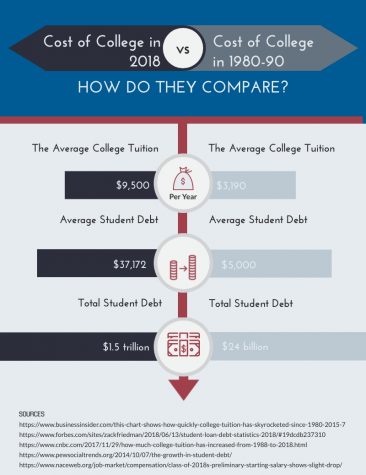Free our college
Warren’s controversial Free College Plan is a step toward fairness, economic growth
U.S. Senator Elizabeth Warren, D-Mass., speaks at the 2019 National Forum on Wages and Working People in Las Vegas. Recently, she proposed a controversial plan to make a college education more affordable for the majority of Americans. Photo courtesy of Gage Skidmore. Accessed via Flickr Creative Commons. Reposted with permission.
May 31, 2019
As we near the end of the school year, college is foremost in everybody’s mind. Seniors are graduating, mere months away from attending college, and juniors and sophomores are beginning to stress about their impending college applications. But even after you’ve applied and been accepted to your choice school, there’s something else to stress about: student debts.
Paying off student loans is a shadow that often follows graduates throughout their adult lives, sometimes even 20 years after they left college. If you want to go to a good college, even sometimes an in-state one, you will most likely have to apply for a student loan. And this vicious cycle often repeats itself, passing debt from generation to generation.
Throughout its history, America has been relatively unforgiving and critical of student debt. Students, voicing their grievances, have been met with responses varying from “Maybe you should’ve gone to a cheaper college,” to “Just get a job,” or even the occasional, “Stop complaining.” But the students already have jobs, and all they’re asking for is a good college education. Why should they be the generation that has to give up on its dreams?

On April 22, U.S. Sen. Elizabeth Warren, D-Mass., a 2020 presidential candidate, premiered a plan for reducing student debt. Though this plan has been met with vehement criticism and praise, it is one of the most liberal and progressive plans proposed in recent years, and it solves a major issue that has been hitherto unaddressed. Warren’s plan, though controversial, would drastically reduce student debts and make all higher education free for all citizens.
Warren’s plan would cancel $50,000 of student debt per family involved in higher education, and, even more controversially, would make all higher public education free for all. According to Business Insider, this plan would eliminate at least some debt for at least 95 percent of the 45 million Americans affected by debt. This plan has been praised by progressives, who agree with the idea of education for all, but it has also been met with opposition from conservatives, including some Democrats, who believe that this solution is too expensive, and ultimately won’t be effective enough.
Warren’s proposal is based on her belief that education (even through college) is necessary and key to a successful life in the modern world. She believes that because it is essential, public education shouldn’t be a cost students have to pay, that it should be the responsibility of the federal government to pay for students’ public education, even at the college level. But conservatives believe that this plan would cost too much money, and especially oppose it because it would be paid for by a wealth tax on America’s 75,000 most wealthy families, totalling a reported $1.25 trillion, according to Business Insider.
Though some critics claim that this plan could lead to poor taxpayers funding wealthy kids college education, this plan would instead drastically decrease college costs, so taxpayers wouldn’t be paying near as much money as they pay now. This would also work to level the playing field, as children from economically disadvantaged families would have more of an equal opportunity to attend and pay for college, which could end the cycle of debt and level the playing field.
Even if less advantaged families had to pay more, it would be with the knowledge that their children would be getting part of their money, and that their children would be getting the same opportunity as more affluent students. Maybe it would hurt at first, but it would ultimately help in the long run. And it could turn America into the country of opportunity that it has always aspired to be.
Everyone I know has always been stressed about paying off college debts. My senior friends have been scrambling around, trying to get as many scholarships and as much money as they can, trying to afford their dream schools. Even my parents have made a point of not retiring until I leave college because they know how expensive it is going to be. I feel bad about it, and sometimes I wonder if I should just go to a less expensive college, but I don’t think that’s fair. Why should the cost of schools limit my education opportunity?
Though not all countries offer free college, CNN reports that a majority of the major European countries offer reduced tuition at a fragment of the cost of traditional U.S. tuition. A girl I know, who was planning on attending Columbia, is going to go to London for college, which is just as or less expensive than Columbia would’ve been. An international school is cheaper to go to than an American school.
Education isn’t a normality in many countries, but it is in America. For hundreds of years, America has emphasized college and university as the ultimate opportunity to succeed. But, realistically, this ideal is getting harder and harder to achieve. As college prices go up, students continue to attend, but these students, who are just trying to get an education, are plunged into debt.
If college wasn’t as normalized and accepted all throughout America, student debt wouldn’t be as much of a problem. But it is. For most students, college is the expectation, the final hoop they have to jump through before they begin their college lives. But now, this expectation is following them around, in the form of student debt. It trails students around for years and has the potential for ruining their lives.
Though Warren’s plan is admittedly very liberal and has the potential to harm poorer tax payers, ultimately, it has its roots in good intentions. This is a major problem for the American youth, and free college would make an extreme difference in their lives.
Realistically, this plan probably won’t make it very far, even if Warren gets elected. There are too many flaws, too many issues for both Democrats and Republicans. But we should continue trying to do something about it, to save both the future of America and our bank accounts.




